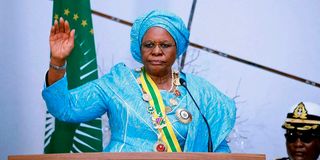Namibia's female leaders shouldn't be judged on "women's issues" alone

Namibia's first female President Netumbo Nandi-Ndaitwah during her inauguration at the State House in Windhoek on March 21, 2025. Namibia is the first African country ever to have women occupy the two top positions at the same time. Lucia Witbooi is the vice president.
What you need to know:
- Namibia's election of President Nandi-Ndaitwah and appointment of a gender-balanced cabinet marks historic progress for women in political leadership.
- While this breakthrough shatters glass ceilings, these women leaders will face unfair scrutiny and performance pressure that their male counterparts never experience.
- True equality will only be achieved when leaders are judged by their abilities rather than their gender.
The paucity of women in top political leadership positions persists globally. It is from this background that Namibia stands out following the election of its first female president, Netumbo Nandi-Ndaitwah, late last year and appointment by the same of a gender-balanced cabinet and a woman, Lucia Witbooi, as her vice president. This makes Namibia the first African country ever to have women occupy the two top positions at the same time. Namibia also has a female Speaker of the National Assembly, Saara Kuugongelwa-Amadhila.
Few countries have had two women in the highest political offices. One is Estonia, which had a female president (Kersti Kaljulaid) and female prime minister (Kaja Kallas) in 2021. Another is Barbados, which became a republic in November 2021 with a female president, Dame Sandra Mason, and a female prime minister, Mia Mottley.
In the Namibian cabinet announced last month, women occupy nine positions (if the president and her deputy are included) against five men and two in deputy ministerial positions. This makes the cabinet relatively symmetrical but with a slight skew in favour of women. Certain portfolios often stereotypically allocated to men, such as international relations, trade and finance, were also assigned to women.
Yet the step by President Nandi-Ndaitwah only continues a trend set by her predecessor, Hage Geingob, who had women occupying 38 per cent of ministerial positions in his last cabinet in which 71 per cent of the deputy ministers were also women. This shows that open-minded men can also promote gender parity. In fact, it is President Geingob who endorsed Netumbo Nandi-Ndaitwah to succeed him.
Presence of women in top positions contributes to the shattering of the famed glass ceiling and demolition of the sticky floor. The former refers to systematic resistance to women ascending topmost positions. They can see through the transparent glass. But it physically obstructs and pushes them back when they try to rise. The latter refers to the consignment of women to the lowest ranks, chained by a glue that asserts a gravitational pull tethering them to the base.
The attention the women in Namibia’s cabinet have attracted means they will face close scrutiny about their delivery. This is the phenomenon of performance pressure, requiring women to outperform men to be recognised and acknowledged. It is characterised by a tendency to be over-critical of and blame women collectively for individual failures. It means that these ministers will have to grow thick skins to override malicious criticisms.
From the concept of symbolic consequences, the female Namibian cabinet ministers will particularly be expected to deliver on issues that are of cardinal importance to women. This is partly right because they share in the problems for biological and social reasons. But it is also ideologically inappropriate because women are not appointed to serve only their kind.
Likewise, men in positions of leadership should not be excused from addressing gender issues. Judging the women by what they have done for women could be a poisoned chalice. If they over-concentrate on feminised issues, they will be accused of bias and discrimination; but if they don’t, they will be accused of insensitivity. Hopefully, they will strike a balance and not succumb to unnecessary pressure.
One commentator on the Namibian situation called it “powerful optics” – that it sent a clear message of the president’s convictions. President Nandi-Ndaitwah affirmed this in an interview with the British Broadcasting Corporation when she said that “women can also hold authority”.
However, the observer noted (correctly), that appointment of women to high positions “does not automatically translate into structural change for women’s rights” because this constitutes only formal rather than substantive representation. Indeed, the commentator warned that unless the women are committed to challenging patriarchy, “female leadership can serve as a mere extension of the status quo.”
But even when they are willing to espouse transformation, women often face resistance, including sabotage and captivity to political machinations, cooptation, partisan loyalty and subjection to domestic and cultural norms that subordinate them despite their high offices.
The rise of women to top leadership in Namibia and elsewhere is an indication, albeit slow, that the world will one day realise the dream of “perfect equality”, as philosopher John Struart Mill called it. This resonates with the words of Martin Luther King Jr in the famous “I Have a Dream” speech of August 28, 1963. Whereas King Jr dreamt of a world free of racial discrimination, we must envision one where both women and men are appointed to positions not because of their gender but ability, and one in which they will not be judged by their identity but performance.
The writer is a lecturer in Gender and Development Studies at South Eastern Kenya ([email protected]).


